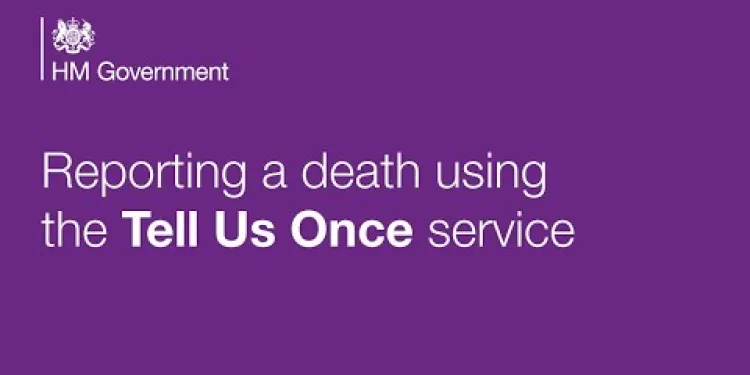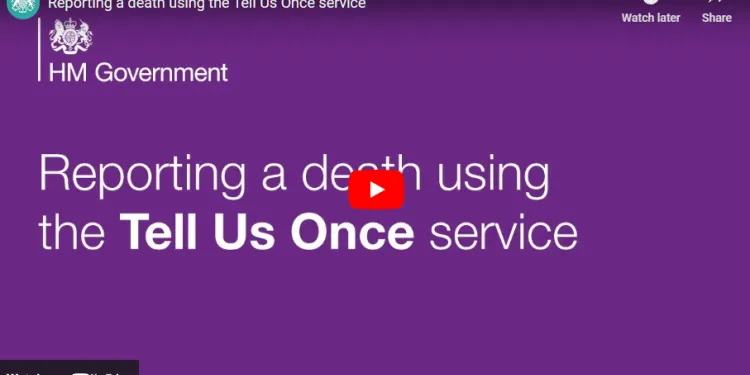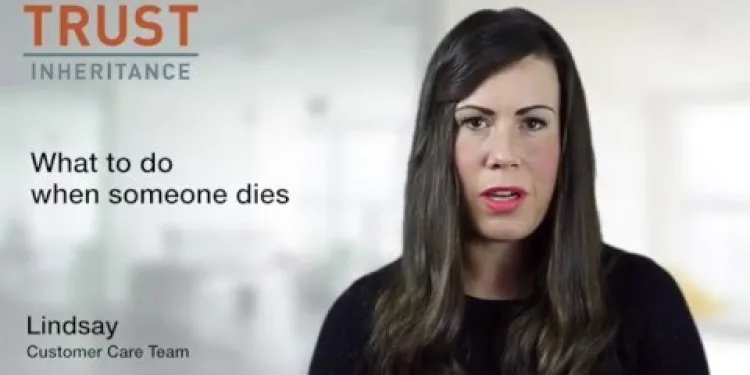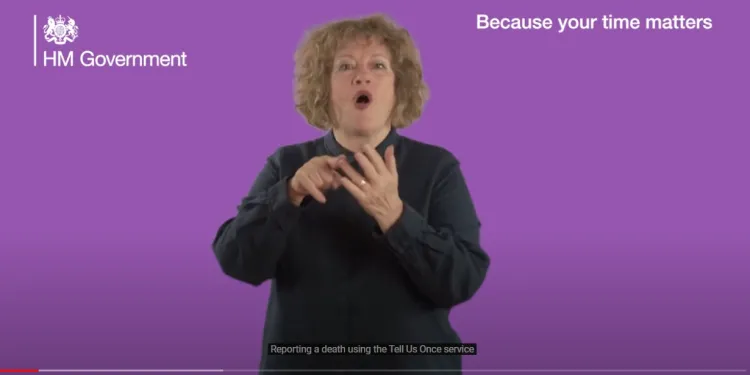
Find Help
More Items From Ergsy search
-

The new death certification process in the UK
Relevance: 100%
-

What is a burial certificate?
Relevance: 75%
-

What documents are required to register a death?
Relevance: 67%
-

How do I notify HMRC of someone’s death?
Relevance: 54%
-

Do first aid certifications expire?
Relevance: 54%
-

Do I need to inform HMRC about the death?
Relevance: 51%
-

Alcohol-Related Deaths in Scotland
Relevance: 51%
-

What is the best first aid certification to obtain?
Relevance: 50%
-

Is certification necessary for primary care support workers?
Relevance: 49%
-

How soon after death can a burial take place?
Relevance: 49%
-

Reporting a death using the Tell Us Once service
Relevance: 48%
-

What happens to the pension benefits upon the death of a firefighter?
Relevance: 44%
-

Are landlords required to provide energy performance certificates?
Relevance: 43%
-

Reporting a death using the "Tell Us Once" service
Relevance: 43%
-

Can I take bereavement leave for the death of a close friend?
Relevance: 42%
-

What Happens to Tax Debt After Death? (UK Laws)
Relevance: 40%
-

What is the first step in arranging a funeral in the UK?
Relevance: 40%
-

What to do when someone dies
Relevance: 39%
-

Reporting a death using the Tell Us Once service - Sign Language Version
Relevance: 38%
-

How is Inheritance Tax (IHT) dealt with after death?
Relevance: 37%
-

How long is the DVSA Theory Test certificate valid?
Relevance: 36%
-

What documentation might I need for bereavement leave?
Relevance: 35%
-

Safe sleeping and reducing the risk of Sudden Infant Death Syndrome (SIDS)
Relevance: 35%
-

Do fake weight loss products often have false certifications?
Relevance: 35%
-

Is it important to renew my first aid certification?
Relevance: 28%
-

How to arrange a funeral in the UK
Relevance: 27%
-

Are there regulations on transporting the body before the funeral?
Relevance: 25%
-

What is the NHS Low Income Scheme?
Relevance: 21%
-

What documents will I need to apply for a Funeral Expenses Payment?
Relevance: 21%
-

What is NHS Low Income Scheme?
Relevance: 20%
-

What is the NHS Low Income Scheme?
Relevance: 20%
-

Where can I learn first aid online?
Relevance: 20%
-

What historical event is the bubonic plague known for?
Relevance: 20%
-

How do I apply for the NHS Low Income Scheme?
Relevance: 20%
-

What should I do if I need help managing the tax affairs of the deceased?
Relevance: 19%
-

How soon after the funeral can the cremation take place?
Relevance: 19%
-

What is the role of an executor in handling tax debts?
Relevance: 19%
-

Can I arrange a funeral service myself without a funeral director?
Relevance: 19%
-

What is the role of a funeral director in a traditional burial?
Relevance: 18%
-

What is the seven-year rule relating to inheritance tax?
Relevance: 18%
The New Death Certification Process in the UK
The United Kingdom has implemented a new death certification process designed to improve accuracy, efficiency, and transparency. This updated process seeks to streamline the administration following a death, ensuring that bereaved families receive clearer information and support during a challenging time.
Key Changes in the Death Certification Process
The new process introduces several important changes in how deaths are certified in the UK. Traditionally, death certification involved a doctor completing a medical certificate of cause of death (MCCD) without much oversight. However, the updated approach now incorporates the role of Medical Examiners—independent doctors who review the causes of death. Medical Examiners are responsible for ensuring the accuracy of death certifications and providing families with an opportunity to ask questions and understand the process more thoroughly.
The Role of Medical Examiners
Medical Examiners serve as an additional layer of oversight within the death certification process. Their involvement aims to increase transparency and accountability, reducing the risk of errors and ensuring that all deaths are accurately documented. By reviewing the deceased's medical history and consulting with the attending physicians, Medical Examiners confirm the cause of death or suggest further investigation if necessary. This practice provides families with reassurance and confidence in the official documentation.
Benefits for Bereaved Families
The new death certification process offers several advantages for bereaved families. One of the most significant benefits is the opportunity for relatives to discuss the cause of death with the Medical Examiner. This ensures that any concerns they might have are addressed and that they fully understand the medical circumstances surrounding their loved one's passing. Additionally, the improved process aims to expedite the issuance of the death certificate, minimizing delays and allowing families to proceed with funeral arrangements and estate matters more efficiently.
Conclusion
The introduction of a revised death certification process in the UK marks a significant development in post-mortem processes. By including Medical Examiners and enhancing communication with bereaved families, the system strives to provide accuracy, transparency, and support at a sensitive time. Consequently, the new procedure not only ensures better compliance and accountability but also serves the needs of the grieving families more effectively.
The New Death Certification Process in the UK
The UK has a new way to certify deaths. This change aims to make things clearer and faster for families when someone passes away. It helps families understand what happens and offers support during this tough time.
Key Changes in the Death Certification Process
There are some important changes in how deaths are confirmed in the UK. Before, a doctor would fill out a form about the cause of death alone. Now, there are Medical Examiners who check the cause of death. These are special doctors who make sure the information is right and help families understand the process.
The Role of Medical Examiners
Medical Examiners add an extra check to make sure everything is correct. They help to reduce mistakes. They look at the person's medical history and talk to doctors who cared for the person. This helps confirm the cause of death or decide if more checks are needed. This gives families confidence in the documents they receive.
Benefits for Bereaved Families
The new process helps families in many ways. Families can talk to the Medical Examiner about the cause of death. This helps answer any questions they might have. It also helps families get the death certificate faster, so they can plan the funeral and take care of other important things.
Conclusion
The new death certification process in the UK is a big change. It includes Medical Examiners and improves how families hear about and understand the process. This new system helps keep records accurate and supports families during a difficult time.
Frequently Asked Questions
What is the new death certification process in the UK?
The new death certification process in the UK involves changes to how deaths are certified, registered, and how cremation authorizations are handled. This aims to improve the accuracy and reliability of data on causes of death and to streamline processes for bereaved families.
Who is responsible for certifying a death in the UK?
A registered medical practitioner is responsible for certifying a death in the UK by completing the Medical Certificate of Cause of Death (MCCD).
What is the role of the Medical Examiner in the new process?
The Medical Examiner reviews all death certificates (except those where the death is referred to the coroner) to ensure accuracy and clarity. They also provide advice to bereaved families about the cause of death.
How does the new process affect cremation forms?
Under the new process, the role of Medical Referee for cremation forms has been removed, and the Medical Examiner provides scrutiny before authorizing cremations.
What are Medical Examiners required to review?
Medical Examiners are required to review the Medical Certificate of Cause of Death and discuss it with the certifying doctor. They may also liaise with the relatives and review the medical records if necessary.
How will the new process impact families of the deceased?
Families will benefit from clearer communication and explanation of the cause of death, as Medical Examiners provide an additional level of scrutiny and support during the registration of the death.
Are all deaths reviewed by a Medical Examiner?
Most deaths, which are not referred to the coroner, will be reviewed by a Medical Examiner. Deaths referred to the coroner for investigation will follow a separate process.
What is the purpose of the Medical Certificate of Cause of Death (MCCD)?
The MCCD is a legal document that certifies the cause of death. It is used to register the death with the local registrar and may be required for funeral and burial arrangements.
How have the roles of coroners changed under the new process?
The referral criteria to coroners remain largely the same, but Medical Examiners will now provide an initial level of scrutiny before a death is referred to a coroner.
Is consent from the family required before a death is certified?
Consent from the family is not required to certify a death, but Medical Examiners will discuss findings with the family to ensure transparency and address any questions or concerns.
Who can register a death in the UK?
A death can be registered by a close relative, someone present at the death, an occupant of the premises where the death occurred, or the person arranging for the funeral.
What is the time frame for registering a death in the UK?
A death should be registered within five days in England, Wales, and Northern Ireland, and within eight days in Scotland, unless a coroner's investigation or inquiry is underway.
How does the new process ensure the accuracy of death statistics in the UK?
The additional review by Medical Examiners helps ensure that the causes of death are recorded more accurately, providing better quality data for public health statistics and policy-making.
What documents are needed to register a death?
The documents typically needed include the Medical Certificate of Cause of Death (MCCD), any medical card of the deceased, and information about their date and place of birth and death, full name, occupation, and address.
Can the death registration process be done online?
In certain cases, death registration can be initiated online or by phone, but a face-to-face appointment at a register office is usually required to complete the registration.
What is the new way to say someone has died in the UK?
In the UK, there is a new way doctors say someone has died. This is called the death certification process.
Here is how it works:
- When someone dies, a doctor writes a paper. This paper says the person has died and why.
- Then, the paper is sent to the right office to keep a record.
- The family of the person who died gets a copy too.
The new way is meant to be clear and help everyone understand.
If you need more help, you can:
- Ask a family member to explain.
- Use a website that explains things simply.
- Talk to a helper at a community center.
The way deaths are recorded in the UK has changed. This helps make sure the reasons why people die are written down correctly. It also makes things easier for families when someone dies.
Who says someone has died in the UK?
A doctor usually says when someone has died.
If the doctor is not sure, they get help from a special doctor called a coroner. A coroner makes sure everything is checked.
If you need help, you can ask a friend or family member.
You can also use a computer or phone to find websites that explain things more simply.
A doctor needs to fill out a special paper in the UK to say why someone died. This paper is called the Medical Certificate of Cause of Death (MCCD).
What does the Medical Examiner do in the new process?
The Medical Examiner helps make sure that doctors fill out forms correctly when someone dies. They check the details to make sure everything is right.
If something is not clear, the Medical Examiner can talk to the doctor to ask questions. This helps to understand more about how and why the person died.
Using tools like picture cards or simple charts can help explain things better. You can also ask someone to explain if you don’t understand.
A Medical Examiner checks death documents (except those that go to the coroner) to make sure they are right and clear. They also help families understand why someone died.
If you find reading hard, using a finger or a colorful ruler can help you follow the words. Audio books or apps that read text out loud might also be useful.
What changes are there for cremation forms with the new process?
The new process is a new way of doing something.
It will change the forms for cremation.
Cremation is when a person's body is turned into ashes after they have died.
Here are some things that might help:
- Ask someone to read the forms with you.
- Highlight important words with a bright color.
- Take notes about the new steps.
Now, a Medical Examiner checks forms before letting a cremation happen. The Medical Referee job is no longer needed.
What must Medical Examiners look at?
Medical Examiners have to check certain things. These include:
- Death certificates
- Medical records or notes
- Any reports from doctors or hospitals
Medical Examiners help make sure information about a person's death is correct. They also talk to families to help them understand what happened.
If you need help reading, you can ask someone to read the information with you or use tools like audiobooks or reading apps. They can help make reading easier.
Medical Examiners have an important job. They look at the paper that says why a person died and talk to the doctor who wrote it. They might also talk to the person's family and check the person's health records if they need to.
What will the new process mean for families who lost someone?
Families can get help from Medical Examiners. They explain why someone has died in a clear way. This helps when registering the death.
Do all deaths get checked by a Medical Examiner?
When a person dies and it's not unusual, a doctor called a Medical Examiner will look at it. If the death needs to be checked more, another doctor called a coroner will investigate.
Why Do We Have a Medical Certificate of Cause of Death (MCCD)?
A Medical Certificate of Cause of Death (MCCD) tells us why a person has died.
Doctors fill out this paper to explain the reason for the death.
This helps loved ones know what happened. It also helps to keep records for the government.
If you find reading hard, you can ask someone for help. A family member or friend can read it with you.
The MCCD is an important paper that explains why someone died. It helps to officially record the death and might be needed to plan the funeral and burial.
What is different for coroners now?
Coroners have new jobs to do. Things have changed in their work.
To understand more, ask someone to help explain. You can also use tools like picture stories or listen to audiobooks.
The rules for sending a case to a coroner have mostly stayed the same. But now, Medical Examiners will also check things first before a death goes to a coroner.
Do you need to ask the family before saying someone has died?
You do not need the family's permission to say someone has died. But doctors will talk to the family. They do this to be open and answer any questions the family has.
Who can tell the government someone has died in the UK?
If someone dies, you need to tell the government. This is called 'registering a death'.
Here are who can do it:
- A family member.
- Someone who was there when the person died.
- Someone who lives in the same house as the person who died.
- The person paying for the funeral.
- A friend who knew about the death.
It's good to have someone help you with this. You can ask a family member or friend. You can also use tools like a calendar to remember when you need to do it, or make a list of the things you need to take with you.
A death can be recorded by a close family member, someone who was there when the person died, someone who lives at the place where the person died, or the person planning the funeral.
How long do you have to register a death in the UK?
You must tell the government when someone dies. This is called registering a death.
In the UK, you have 5 days to do this. It is a bit more than half a week.
If you find this hard, you can ask someone to help. You can talk to a friend or family member. They can help you fill in forms or talk to people.
When someone dies, it needs to be written down officially. In England, Wales, and Northern Ireland, this should be done in five days. In Scotland, it should be done in eight days. But if the police are looking into the death, it might take longer.
How does the new way help check that the numbers of people who have died in the UK are right?
Medical Examiners check the causes of death. This helps make sure the information is right. This means we have better numbers for health reports and making rules.
What papers do you need to tell someone about a death?
You usually need these papers:
- A paper that says the person has died. It's called a Medical Certificate of Cause of Death (MCCD).
- Their medical card, if they have one.
- When and where they were born and when and where they died.
- Their full name.
- Their job.
- Their home address.
If you find it hard to understand documents, you can ask someone to help you. A family member, friend, or helper can make reading easier. Highlight important words or use a ruler to follow lines. Apps that read text aloud can also help.
Can you register a death on the internet?
Yes, you can do it online. Here are some tips to help:
- Use a computer or tablet with internet access.
- Ask someone to help if you need support.
- Look for websites with clear instructions.
- Use helpful tools like screen readers or text-to-speech if you need them.
If you are unsure, it's okay to call the local office for help. They can guide you on what to do.
Sometimes, you can start to register a death online or by calling on the phone. But, you usually need to visit a register office in person to finish the process.
Useful Links
This website offers general information and is not a substitute for professional advice.
Always seek guidance from qualified professionals.
If you have any medical concerns or need urgent help, contact a healthcare professional or emergency services immediately.
Some of this content was generated with AI assistance. We’ve done our best to keep it accurate, helpful, and human-friendly.
- Ergsy carfully checks the information in the videos we provide here.
- Videos shown by Youtube after a video has completed, have NOT been reviewed by ERGSY.
- To view, click the arrow in centre of video.
- Most of the videos you find here will have subtitles and/or closed captions available.
- You may need to turn these on, and choose your preferred language.
- Go to the video you'd like to watch.
- If closed captions (CC) are available, settings will be visible on the bottom right of the video player.
- To turn on Captions, click settings .
- To turn off Captions, click settings again.
More Items From Ergsy search
-

The new death certification process in the UK
Relevance: 100%
-

What is a burial certificate?
Relevance: 75%
-

What documents are required to register a death?
Relevance: 67%
-

How do I notify HMRC of someone’s death?
Relevance: 54%
-

Do first aid certifications expire?
Relevance: 54%
-

Do I need to inform HMRC about the death?
Relevance: 51%
-

Alcohol-Related Deaths in Scotland
Relevance: 51%
-

What is the best first aid certification to obtain?
Relevance: 50%
-

Is certification necessary for primary care support workers?
Relevance: 49%
-

How soon after death can a burial take place?
Relevance: 49%
-

Reporting a death using the Tell Us Once service
Relevance: 48%
-

What happens to the pension benefits upon the death of a firefighter?
Relevance: 44%
-

Are landlords required to provide energy performance certificates?
Relevance: 43%
-

Reporting a death using the "Tell Us Once" service
Relevance: 43%
-

Can I take bereavement leave for the death of a close friend?
Relevance: 42%
-

What Happens to Tax Debt After Death? (UK Laws)
Relevance: 40%
-

What is the first step in arranging a funeral in the UK?
Relevance: 40%
-

What to do when someone dies
Relevance: 39%
-

Reporting a death using the Tell Us Once service - Sign Language Version
Relevance: 38%
-

How is Inheritance Tax (IHT) dealt with after death?
Relevance: 37%
-

How long is the DVSA Theory Test certificate valid?
Relevance: 36%
-

What documentation might I need for bereavement leave?
Relevance: 35%
-

Safe sleeping and reducing the risk of Sudden Infant Death Syndrome (SIDS)
Relevance: 35%
-

Do fake weight loss products often have false certifications?
Relevance: 35%
-

Is it important to renew my first aid certification?
Relevance: 28%
-

How to arrange a funeral in the UK
Relevance: 27%
-

Are there regulations on transporting the body before the funeral?
Relevance: 25%
-

What is the NHS Low Income Scheme?
Relevance: 21%
-

What documents will I need to apply for a Funeral Expenses Payment?
Relevance: 21%
-

What is NHS Low Income Scheme?
Relevance: 20%
-

What is the NHS Low Income Scheme?
Relevance: 20%
-

Where can I learn first aid online?
Relevance: 20%
-

What historical event is the bubonic plague known for?
Relevance: 20%
-

How do I apply for the NHS Low Income Scheme?
Relevance: 20%
-

What should I do if I need help managing the tax affairs of the deceased?
Relevance: 19%
-

How soon after the funeral can the cremation take place?
Relevance: 19%
-

What is the role of an executor in handling tax debts?
Relevance: 19%
-

Can I arrange a funeral service myself without a funeral director?
Relevance: 19%
-

What is the role of a funeral director in a traditional burial?
Relevance: 18%
-

What is the seven-year rule relating to inheritance tax?
Relevance: 18%


